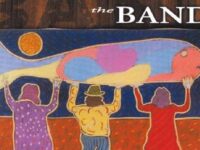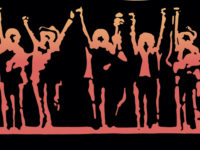Jubilation, the Band’s career-closing album, held together as well as any they’d produced since Northern Lights-Southern Cross, recalling their best moments — up to, and including, their long association with Allen Toussaint.
The appearance of his “You See Me [Blind Fool’s Love],” in fact, extended a tradition of soulful symmetry with Toussaint that stretched back to the early 1970s. Just as importantly, this track got there in an off-handed manner that matched both the lived-in tone of Jubilation, and the Woodstock setting — where, after all, the twin triumphs of Music from Big Pink and The Basement Tapes had sprung from similarly loose, free-form jams some three decades earlier.
They’d reportedly started off playing “You See Me” as a jam, trying to get a feel for the sound in the converted barn that Levon Helm had turned into a studio when, all of a sudden, that old magic returned. Of course, much had changed over that time, not least of which was Helm’s approach with the lyric.
Stricken with throat cancer in the 1990s, he’d managed to survive — and managed to save his voice — but Jubilation finds Levon missing much of his familiar power. Oddly enough, that works in his favor on “You See Me,” which was perhaps best known for its 1969 interpretation by Robert Parker, from Barefootin.’ Whereas Parker’s classic New Orleans-flavored take bursts forward with a locomotive energy, Helm is able to give the song more of an unshackled, swaying feel. Producer Aaron Hurwitz also moves the slewing, Garth Hudson-led horns into clearer focus, only adding to the track’s welcoming approachability.
This familial, low-key atmosphere, meanwhile, led to rotating cast of characters for much of Jubilation, as all six of the then-current Band members switched instruments or laid out entirely. Rick Danko, for instance, doesn’t appear on “You See Me,” while elsewhere Helm is absent on “Book Faded Brown.” Among the others who joined in the fun during these sessions were friends and family like Sister Maud Hudson, Amy Helm and Marie Spinosa, and bigger stars including Eric Clapton, Tom Malone of the Blues Brothers and John Hiatt.
Helm, Hudson and Hurwitz (who provided additional piano, organ and accordion throughout Jubilation) are paired here by guitarist Jim Weider, Malone and Mike Dunn, who handled bass on “You See Me,” “Kentucky Downpour” and on their ode to Ronnie Hawkins, “White Cadillac.” Randy Ciarlante adds background vocals.
Still, even without Danko or the long-departed Robbie Robertson and Richard Manuel, there’s no denying the broader connection that this track reestablishes, not just with Toussaint — who handled horn charts for 1971’s Academy of Music concerts and 1978’s The Last Waltz; wrote “Holy Cow” on 1973’s Moondog Matinee by the Band and “Play Something Sweet” on 1978’s Levon Helm; and then collaborated on Helm’s superlative 2008 finale Electric Dirt — but to a series of the Band’s soul-lifting successes covering R&B material that includes “Lovin’ You Is Sweeter Than Ever” and “Don’t Do It.”
It’s an underrated portion of the Band’s inestimable legacy, as they’re typically pigeonholed as country rockers, forefathers of Americana, pickers and grinners. Some, or all, of that may be true, but they also had — right until the very end — the ability to refashion this kind hip-shaking soul number into something completely their own.
- How Deep Cuts on ‘Music From Big Pink’ Underscore the Band’s Triumph - July 31, 2023
- How ‘Islands’ Signaled the Sad End of the Band’s Five-Man Edition - March 15, 2022
- The Band’s ‘Christmas Must Be Tonight’ Remains an Unjustly Overlooked Holiday Classic - December 25, 2016




